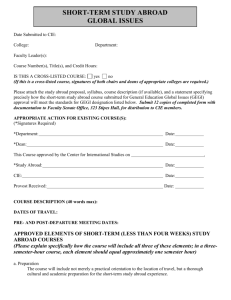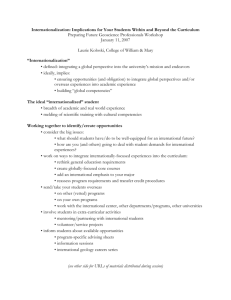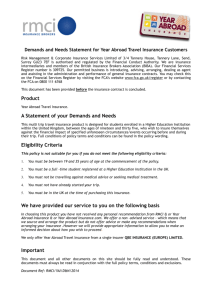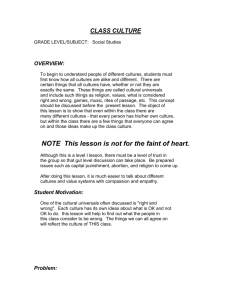2014-15 Funded Faculty Internationalization Grants
advertisement
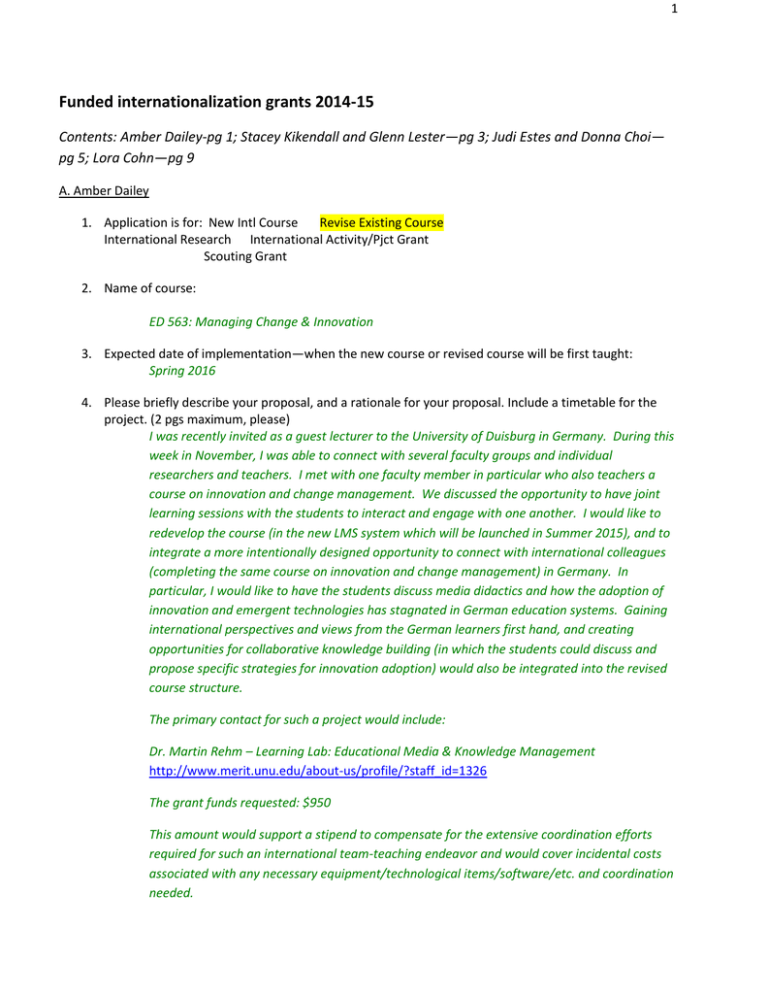
1 Funded internationalization grants 2014-15 Contents: Amber Dailey-pg 1; Stacey Kikendall and Glenn Lester—pg 3; Judi Estes and Donna Choi— pg 5; Lora Cohn—pg 9 A. Amber Dailey 1. Application is for: New Intl Course Revise Existing Course International Research International Activity/Pjct Grant Scouting Grant 2. Name of course: ED 563: Managing Change & Innovation 3. Expected date of implementation—when the new course or revised course will be first taught: Spring 2016 4. Please briefly describe your proposal, and a rationale for your proposal. Include a timetable for the project. (2 pgs maximum, please) I was recently invited as a guest lecturer to the University of Duisburg in Germany. During this week in November, I was able to connect with several faculty groups and individual researchers and teachers. I met with one faculty member in particular who also teachers a course on innovation and change management. We discussed the opportunity to have joint learning sessions with the students to interact and engage with one another. I would like to redevelop the course (in the new LMS system which will be launched in Summer 2015), and to integrate a more intentionally designed opportunity to connect with international colleagues (completing the same course on innovation and change management) in Germany. In particular, I would like to have the students discuss media didactics and how the adoption of innovation and emergent technologies has stagnated in German education systems. Gaining international perspectives and views from the German learners first hand, and creating opportunities for collaborative knowledge building (in which the students could discuss and propose specific strategies for innovation adoption) would also be integrated into the revised course structure. The primary contact for such a project would include: Dr. Martin Rehm – Learning Lab: Educational Media & Knowledge Management http://www.merit.unu.edu/about-us/profile/?staff_id=1326 The grant funds requested: $950 This amount would support a stipend to compensate for the extensive coordination efforts required for such an international team-teaching endeavor and would cover incidental costs associated with any necessary equipment/technological items/software/etc. and coordination needed. 2 8. What are the learning objectives for your project? And, explain how these objectives are consistent with the statement on the globally competent graduate and with to the international learning outcomes. Our graduate program for the Masters in Adult Education degree focuses on 5 competencies. They include: 1) Active Inquiry, 2) Global & Community Learning, 3) Critical & Strategic Thinking, 4) Ethics and Moral Reasoning, and 5) Integrative and Applied Learning. As a high level course in this program, it addresses all 5 competencies. Objective 1: To improve international collaborative knowledge sharing and knowledge building among students at Park and learners at other institutions around the globe (Germany in particular). Objective 2: To connect two classes in separate countries who are studying the same topic – and who have different world views on such topics to share with one another. 9. How will your proposal benefit students? Students will connect with challenges facing today’s learning institutes (particularly those in Germany) and work collaboratively to create innovative and effective learning solutions. They will further develop skills to better equip them for a global workplace. 10. Why have you selected this particular course for revision. ; or, why have you decided to create this particular course? This course offers the most overlap between two courses (Innovation & Change management at Park and at the University of Duisburg) that would allow for team-teaching opportunities, team-based discussions and project work among the learners, and overlap of concepts from different cultural perspectives. Furthermore, the perspective of technology to support learning is vastly different in Germany than in the United States and exposure to such differences could create learning opportunities for both groups. 11. How will this revision or new course fit in with the university’s internationalization strategic plan, including Park’s Promise? Park’s Promise states, “serving those who serve their community and country with personalized, globally relevant education for life”. This course revision will enhance and provide globally relevant education that gains global perspectives from residents of different countries. 12. How does your revision/new course encourage cooperative learning among disciplines and among all students (domestic and international)? 3 The students will interact directly with one another via videoconference calls, discussion threads, social networks, and other formats avaialble. B. Stacey Kikendall and Glenn Lester Application is for: New Intl Course Revise Existing Course International Research International Activity/Pjct Grant Scouting Grant (If application is for International Research, skip to question 13) (If application is for International Activity/Project Grant, skip to question 16) (If application is for Scouting Grant, skip to question 18) 13. For International Activity Grant: Discuss in detail the activity you propose, and how this activity is consistent with the international goals outlines in Park’s Promise and the Internationalization Strategic Plan. 2 pages maximum. When we look out at our classrooms, we see the world. An internationally diverse student body means that Park University faculty faces new challenges. We are challenged to bridge differences in background knowledge and classroom experience; to communicate with non-native speakers of English; to create positive and supportive classroom climates; to promote academic integrity; and others. As we prepare diverse communities of students to think, communicate, take a global perspective, and engage in lifelong learning, the Park faculty must make teaching the international classroom a priority. Toward that end, we would like to build a reading group focused on "Teaching the International Classroom." This reading group would begin as a small group of Park faculty, approximately 10, with a keen interest in exploring scholarship on teaching international students. We expect that most participants will be full-time faculty in the Parkville area, although we have built into the budget the possibility of including interested full-time faculty at a distance. We anticipate that this initial group will consist of mainly faculty, although we see the potential benefits for staff in areas such as Academic Advising, International Student Admissions and Services, and PDL, among others. This grant will provide the group with "start-up" funding: enough money to purchase 10 copies of an academic text that details a longitudinal study of international college students and one copy of a film documentary on the experiences of international student writers. The grant will also provide the group with funds for mailing materials and providing call-in ability for distance faculty. Finally, the grant would provide a modest budget for snacks for Parkville campus participants. Should funding be awarded, the reading group will meet at least three times during the spring 2015 semester. At our first meeting we will view and discuss the film Writing Across Borders. Writing Across Borders is a documentary film produced by the Oregon State University Center for Writing and Learning. The film, shot over three years, depicts the experiences of international students as they read and write in college. In the words of the filmmakers, the purpose of the film is to "help faculty, writing assistants, and other professionals work more productively with international students in writing environments" ("Welcome to the Writing Across Borders Web Site"). 4 At our second meeting, we will discuss Ilona Leki's book Undergraduates in a Second Language. This book, the result of a five-year longitudinal study, follows the experiences of international and secondlanguage undergraduates in four academic disciplines: social work, nursing, business, and engineering. Reviewers of Undergraduates in a Second Language note that the book examines "specific issues related to literacy development pathways, such as the role of general-education courses and major courses" (Saenkhum and Matsuda), and that the results of the longitudinal study will help professors "to understand the complex and varied ways in which literacy learning happens at the university and to facilitate learning beyond the classroom" (The Bedford Online Bibliography). A reviewer also noted that the book is a fun and involving read, "entertaining and sometimes irreverent " (Harklau). At our third meeting, we will discuss scholarship from across the disciplines on teaching international students. This scholarship will be identified by members of the reading group and located via McAfee Memorial Library holdings and subscriptions. For instance, the group might consider articles such as Hegarty's "Where We Are Now - The Presence and Importance of International Students to Universities in the United States," Dooley's "Advising International Students - Perspectives from the Field," Bourke's "Coming To America: The Influence Of College-Themed Movies On Perceptions Of International Students," or Lee and Rice's "Welcome to America? International student perceptions of discrimination." Our discussions will be aimed at two goals: first, we will seek to understand the experiences and appreciate the diversity of our international students; second, we will work to identify effective practices for teaching international students – practices that we will implement in the classroom and apply to course design. By June 15, 2015, the reading group will provide the Internationalization Committee with a narrative of its experiences, discussions, and plans of action. The reading group will then donate to McAfee Memorial Library one copy of Undergraduates in a Second Language and the Writing Across Borders DVD. Beyond providing much-needed professional development for interested faculty, this reading group has the potential to become a cross-disciplinary incubator for excellent teaching practices; a brainstorming ground for internationally focused research on the scholarship of teaching and learning; a place to coordinate and collaborate with Park staff; a point of intersection with Park's Center for Excellence in Teaching and Learning; and a resource for other faculty experiencing the struggles, challenges, and rewards of teaching the world in a single classroom. Above all, the reading group will create a space for reflection and collaboration on teaching internationally. In the future, the reading group may apply for larger funding projects, including inviting prominent speakers to campus, identifying webinars and conferences on the teaching of international students, coordinating relevant training opportunities for faculty, creating teaching resources, or other activities suggested by the group. We envision this reading group as a first step towards creating a productive learning environment for both our faculty and international students. As the promotional material for Park’s Promise states, The Center for Internationalization and Global Engagement wants institutions of higher education to more actively pay attention to the “evolution of the global environment.” We think this project directly engages with the challenges and opportunities of this new environment. This reading group not only has the ability to make an outsized impact on teaching and learning at Park, but is also consistent with Park's stated values, goals, and priorities. The project is focused on 5 identifying and implementing effective teaching practices and is thus consistent with Park's Promise strategic priority 1, "Ensure Student Success." The project will also help to ensure that our instructional design and delivery meets the needs of our international classrooms – a goal consistent with Park's Promise strategic priority 3, "Ensure Customer Service and Organizational Effectiveness." The goal of the reading group would be to teach international students more effectively, which is consistent with the Internationalization Strategic Plan goal 6.3, which outlines Park's efforts at integrating international students. Finally, the reading group would be an example of faculty and staff development for teaching internationally, consistent with Internationalization Strategic Plan sections 2.6 and 4.2. REQUESTED FUNDING ITEM Writing Across Borders. Dir. Wayne Robertson. Oregon State University, 2005. DVD. PRICE $12.50 + $6 shipping NUMBER 1 Leki, Ilona. Undergraduates in a Second Language: Challenges and Complexities of Academic Literacy Development. New York: Routledge, 2007. Print. $40.58 10 Sound Connect conference calls $0.02/minute x 75 minutes x 2 distance participants $5 x 8 Parkville participants $10 3 meetings $9.00 3 meetings $120.00 Food/drink Shipping costs to send book to distance faculty participants TOTAL 2 TOTAL $18.50 $405.80 $20.00 $573.30 For International Activity/Project Grant: Will your activity attract and appeal to a student audience? How will students benefit from your activity? Because of its focus on learning, discussing, debating, and implementing instructional strategies, the "Teaching the International Classroom" reading group will be designed for faculty, and possibly staff, development. But students will see the effects of our work in many ways: in better instruction for international classrooms, more sensitive advising for international students, more strategic feedback on all student assignments, internationally accessible course design, and so on. These improvements would work towards overall student success, not just here at Park but also in our students' careers and communities. Our hope is that the reading group will come to be seen as a place of informal leadership among the faculty. As it grows and matures, the reading group may well decide to invite students to participate – indeed, the reading group might have a particular appeal for Park undergraduate and graduate students in the communications, education, English, public administration, and management programs. C. Judi Estes and Donna Choi I. Description of the proposed International Grant Activities 6 Dr. Judi Simmons Estes and Dr. Dong Hwa Choi are jointly submitting this proposal requesting that fiscal resources be provided for travel to Belmopan, Belize for the purpose of an exploratory trip to develop a faculty-led service learning study abroad experience. Dr. Estes has been to Belize twice to attend the International Belizean Symposium, each a three day event. Dr. Estes met Mr. Chun and Dr. August at these conferences and they will serve as Belizean contacts for this trip. Dr. Choi has never been to Belize. Neither Dr. Estes nor Dr. Choi have applied for or received this grant before. This grant request is consistent with Park's Promise/Strategic Internationalization Plan. In describing Park's Promise, Priority 1, Ensuring Student Success, it is stated, "Park will increase globally-relevant education that prepares individuals to better serve access to their community and country." While eff01is are made in the School for Education (SFE) to expose students to diverse populations of students during their practicurn experiences, the SFE cuniculurn is in beginning stages of infusing topics of international education. This proposal is a step toward building awareness of international educational issues for students by offering this service learning opp01iunity and these students, in turn, will formally share their experiences with SFE students and faculty upon their return. Specifically, the intent of the exploratory trip will be to identify the needs of the Garden City Primary School in Belmopan, Belize so that plans for a service learning trip for Park University students identified. During the proposed service learning experience, it is also our desire to have students work alongside Belizean peers from Galen University's education department. Based on inf01mation provided by Mr. Kevin Hall, principal of Garden City Primary School, the school serves approximately 386 children, ranging in age from preschool through age fomieen, in 17 classrooms. Children come primarily from lower socioeconomic single family homes with 54% having a horne language of Creole and 34% Spanish; other horne languages include Maya, German, English, Mandarin, and Garifuna. (See Appendix A). In addition to the diverse cultural experiences that Park University can experience at this school, they will also have an opp01iunity to learn about a different political, economic, and social system. II. Statement of the goals and objectives of the proposed Activities Goal of the Project The overarching goal of this project is to establish professional relationships: 1) with administration and teachers at Garden City Primary School in Belmopan, Belize to assess needs in preparation for a service learning study abroad trip for Park University students, and 2) with Dr. Albe1io August, the Dean of Education at Galen University regarding connecting with his institution during the proposed study abroad trip. Objectives include the following: • Inquiry of development of pminership with local primary school: Establish a relationship with administration and teachers at Garden City Primary School in Belmopan, the Cayo District of Belize; the school serves both early childhood and elementary age students. Belmopan is the capital city of Belize with a population of approximately 14,000 residents. • Preliminary assessment of Quality of Education (Quantitative data): While at the school, we will use an international observation too for early childhood programs, ACEI Global Guidelines Assessment" to observe quality of education. This tool will be shared with administration in advance. 7 • • • • • • Preliminary Assessment of Quality of Education (Quantitative Data) Interview administration, teachers, students, and parents in regard to identified needs and barriers to programming. Summarize our observations and the observations of the administration, teachers, students, and parents. Share our findings with administration, teachers, and parents if administration so desires. Inquiry of development of pminership with higher education: Meet with Dr. Albetio August to identify with ways that we might partner with students from his university in our service learning effmis. While abroad, write a blog about our experience with the understanding that the blog will be linked to the Global Education and Study Abroad website; at least twenty photos included in the blog will also be shared to be used for promotion of Park's study abroad program. Within 90 days of return, submit an application for a new Park faculty-led study abroad program that will specify the service learning activities. Serve as an advocate for study abroad for the 2015-2016 academic year including pmiicipating in two study abroad fairs, speaking at Pirate Expeditions, and presenting to the School for Education about the experience and encouraging SFE colleagues to apply for their own study abroad trip. III. Budget for the proposed FDE expenses by category Category Itemized Budget I. Airfare $850-$1200 per person (depending on purchase date) Subtotal: $1700$2050 II. Lodging $110/room for one night Subtotal: $110 x 6 nights = $660 III. Food allowance IV. Ground Transportation: airpmi transfer and ground transportation $47 per day for 6 days=$282 Subtotal: $282x 2=$564 Cab from Belize City to Belmopan $100 (round trip) + $25 for public transpmiation Activities including a detailed description of Justification • Resource: Orbitz.com as of 10/29/14 (Note that the more ahead of time the tickets can be purchased the less the price will be.) Hotel Room Rate is based on information from Dr. August Faculty members will stay in one room Park University per diem = $47 • • Ill Subtotal $125 We intend to stay in Belmopan within walking distance from the school We intend to use public transportation as available The largest transpmiation expense will be from the airpmi in Belize City to Belmopan, approximately 50$ each way 8 • On Friday of our last day at the school we would like to provide a breakfast or lunch during a meeting where we share service Grand Total: $3064-$3414 learning needs identified during the week and a plan IV. Trip Itinerary for how we can meet some those needs.at Garden City Primary 1) December, 2014-June, 2015- Coordinate withof two administrators V. Food for stakeholder breakfast or lunch To be determined as number of peopled are identified (75$) School, Mr. Kevin Hall (Principal), Paul Pio Chun (Assistant Principal) and Dr. Albeti August (Dean of Galen University) input on transportation and lodging and a schedule for the week. 2) December, 2014-June, 2015-Investigate and inquire into the contextual factors involved in the Belizean education system including but not limited to the role of the Ministty ofEducation, the Cayo District in which Garden City Primary School is located, and the operational structure of Garden City Primary School. We want to be well versed about the community and culture before we arrive. Since Garden City Primary School is governed by the Ministry of Education we want to be sure that our activity is in alignment with their guidelines; Dr. August can infmm our work. 3) Arrive in Belize on a Sunday in June and meet with Mr. Hall, Mr. Chun and Dr. August that evening to review plan for the week. 4) This itinerary is a draft; a final itinerary will be finalized with our Belizean colleagues: While abroad, write a blog about our experience with the understanding that the blog will be linked to the Office of Global Education and Study Abroad website; at least twenty photos included in the blog will also be shared to be used for promotion of Park's study abroad program. Day Sunday Activity Travel day; arrive late afternoon Monday Meet with Mr. Hall, Mr. Chun, and Dr. August to discuss the itinerary and our joint interest in a service learning project. Go to Galen University; meet with students who may be interested in participating in a service learning experience; begin to explore a hotel for lodging when students come for the service learning experience and other recommended activities during the service learning experience; begin to identify costs of bussing for students and other needs and costs Take a tour of the school, meet with faculty; perhaps begin observations in classrooms. Observe in classrooms and use assessment tools; in the evening, meet with parents if desired by administration. Our idea is to involve the community in the future service learning project in ways that they may want to be involved. Tuesday Wednesday 9 Thursday Synthesize the information we have gathered into a repmi with suggested service learning activities; pm. begin to identify resources that will be needed and work with administration and Dr. August about how community resources can suppmi the service learning project Friday Share repmi developed on Thursday with administration, faculty, and Dr. August 5) Within 90 days of return, submit an application for a new Park faculty-led study abroad program that will specify the service learning activities. 6) Serve as an advocate for study abroad for the 2015-2016 academic year including pmiicipating in two study abroad fairs, speaking at Pirate Expeditions, and presenting to the School for Education about the experience and encouraging SFE colleagues to apply for their own study abroad trip. D. Lora Cohn 5. Application is for: New Intl Course Revise Existing Course International Research International Activity/Pjct Grant Scouting Grant 6. Name of course: CA103 Public Speaking 7. Expected date of implementation—when the new course or revised course will be first taught: Spring 2015 8. Please briefly describe your proposal, and a rationale for your proposal. Include a timetable for the project. (2 pgs maximum, please) Proposal Develop a 1-2 week unit for CA103 that includes learning activities for class sessions, multiple speech assignments, reading materials, and video materials that focus on speaking to non-American audiences. The unit will include a discussion of different cultures drawn from academic sources and interviews with current Park students to allow students to learn about different cultures. Material will be presented in a positive way to overcome stereotypes and encourage an openness to other cultures. The unit will including a video that features current Park students talking about the differences between their cultures and American culture so that students in more isolated campus centers can experience the diversity that is Park. Video, more so than just text, allows people to feel a connection with others to encourage that empathic and sensitive attitude we desire. Additional in-class activities include: Given sheets with cultural characteristics and a topic card, students will, in groups, develop a persuasive message targeted to that audience. 10 Watch video about different cultures—students talking about speaking in their countries; students will discuss the different perspectives and compare them to speaking to Americans. Research a national culture—brief student reports; students will explore differences between American culture and other global cultures. Watch video of students’ international persuasive speeches; discuss differences from speeches aimed at American audiences. Students should visit a news site from another country and be prepared to tell the class about a controversy or problem that in occurring in that country; in groups, students will discuss the cultural differences that create the issue and barriers to solving it. Small group assignment would be to analyze a controversy between a western nation/the west and another nation (not your own) and how to solve it to meet the needs of both cultures. One speech assignment would be an informative speech on an issue within a national culture. All speeches should demonstrate respect for the nation’s culture. The international audience persuasive speech will focus on adapting arguments, organization, and supporting materials, as well as delivery, to a specific culture. Students will develop a list of characteristics of an audience from a chosen culture that is not their own and develop a persuasive speech to that audience. Rationale 1) CA103 is part of the liberal arts curriculum and thus is one of the key classes to “internationalize.” 2) Currently available texts rarely include materials on speaking to other cultures, except perhaps to talk about speaking to other American co-cultures. The few available texts with an international focus have no support materials for instructors so they are not appropriate given the high number of adjuncts we have. Additionally, available materials are not very good. 3) The internationalization office/committee’s mission includes the ideas that students will display knowledge of world events and cultures, possess an open empathic and sensitive attitude toward different cultures, and effectively communicate with those who are culturally different from themselves. The unit will address those needs. Timetable January 1) Develop a video team to do the video work 2) Research intercultural communication literature 3) Purchase intercultural-related books (which will go to the library after the project is completed) 4) Determine interview questions and generate list of students to interview 11 5) Develop initial brief speech assignment to be used in CA105 to test the assignment 6) Create summer section of CA103 to test materials February 1) Interview students and transcribe interviews 2) Write initial draft of reading material 3) Write initial draft of assignments and activities March 1) Write outline for videos 2) Develop list of international news sites for activity 3) Develop sheets of international culture characteristics 4) Revise reading material based on transcripts April 1) Edit/send out to others to read text material 2) Complete video on international cultures 3) Complete speech video 4) Test assignment in CA105 (my section) May 1) Complete teacher notes/guides for assignments 2) Get graphic design help on page layout of materials 3) Complete class activities, student version Summer 1) Try materials out in a summer section on campus 2) Adapt materials where needed Fall Submit material to PDL for inclusion in online classes 8. What are the learning objectives for your project? And, explain how these objectives are consistent with the statement on the globally competent graduate and with to the international learning outcomes. Deliver a speech appropriate to a specific national culture (not your own). This is consistent with internationalization CLO 3. Analyze a global issue from the perspective of both Western culture and a particular national culture. This is consistent with internationalization CLO 1 Retain deep and contextualized knowledge about at least one culture and/or nation beyond the US. This is consistent with internationalization CLO 3 12 Demonstrate willingness to act upon knowledge and attitudes at a global level This is consistent with internationalization CLO 1 and 2 14. How will your proposal benefit students? Students will learn about other cultures, even if they live in an isolated community. Although military members have been exposed to other cultures, they are usually exposed to Western cultures or in a very limited way to other cultures. For example, I have a graduate student living in Japan but he’s not allowed off base after midnight and speaks no Japanese. Living in a country, without significant interaction with members of that nation, won’t lead to cultural sensitivity or even greater understanding of that culture. This unit will introduce all students to differing cultures. Specifically, students will learn how national cultures differ, develop research skills to find reliable information on specific global cultures, and practice adapting to national cultural differences in public speaking. This will also benefit Park’s international students as they and American students see the value of interacting with others and learning more about our varied cultures. 15. Why have you selected this particular course for revision. ; or, why have you decided to create this particular course? This class is in the liberal education program and is widely taught. We have 41 sections of public speaking this fall online, at campus centers, and in Parkville. It will expose many students to national cultural differences. 16. How will this revision or new course fit in with the university’s internationalization strategic plan, including Park’s Promise? This revision helps ensure student success while supporting the values of global citizenship and civility and inclusivity. It will help students: Analyze and evaluate the forces shaping international events, both in the past and present Retain deep and contextualized knowledge about at least one culture and/or nation beyond the US Demonstrate willingness to act upon knowledge and attitudes, both at local and global levels
